Risk All-Stars
Risk professionals have taken their rightful position at the strategy table. They now have the rapt attention of leadership hungry for actionable real-time data on risks. Technology is fueling that rise in stature with reliable data and insights for more informed decisions.
Risk management is a growing profession with plenty of career opportunities. And the journey to becoming a risk professional is as varied as the personalities involved. For all of our Risk All-Stars, we are honored and proud to be part of your journey. Here are a few of their stories.

Our All-Stars
See what a few of the Risk All-Stars in our community had to say about their risk management journey.
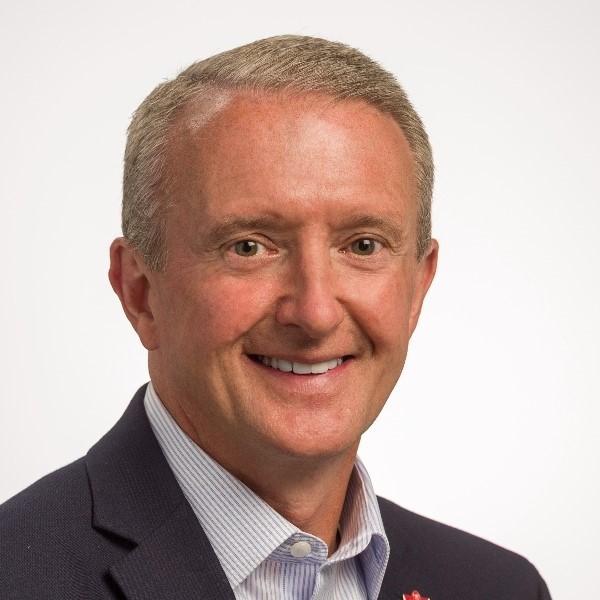
Did you know you wanted to go into the risk profession? If not, what was your journey to get here?
I had no awareness of, nor interest in, risk management. My degree is in restaurant and hospitality management, and I was working in that field. My wife relocated to pursue her master’s degree, and as a result, I entered the insurance industry as a claims adjuster. After about 7 years, I moved into risk management in the business community. I spent about 15 years on the risk management team at Macy’s, where I gained valuable experience across a number of areas associated with managing risk. That experience prepared me for my current opportunity with The Wendy’s Company.
How long have you been working in the risk profession?
I began my career in the insurance industry in 1990 and have been a part of the risk management profession ever since.
What do you love most about what you do?
The best thing is the requirement to learn continually. I’ve been in the industry for 30 years, and I am more conscious now of what I don’t know, what I haven’t yet learned, and what I need to know to survive and thrive.
Has managing risk changed over the course of your career? If so, how?
Absolutely. When I began my career, managing risk may have been more academic theory than practical business application, aside from buying insurance. I’ve been fortunate to be a part of the industry as subject-matter areas and components have developed and become impactful influences in business. I’ve also been a part of the transition as those individual components have combined and integrated to create a cross-functional, enterprise-level industry that’s capable of positively contributing to nearly every aspect of business.
What advice would you give to someone who is about to start their career in the risk profession?
Read, observe and listen. You’ll learn more — and learn that there’s always more to know, as you take in wisdom (the combination of knowledge and experience) from others.
Do you have a personal motto? If so, what is it?
One step from the spotlight is often the most rewarding seat in the house.
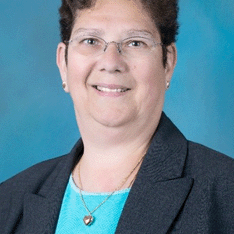
What is your educational background?
BSN – The Catholic University of America School of Nursing, BSN, MSN; University of Maryland School of Law, JD
Did you know you wanted to go into the risk profession? If not, what was your journey to get here?
Not initially. While in law school I clerked a semester for a well-respected nurse attorney, who oversaw risk management for her health system. After working with her and seeing the positive impact she had on patients, providers, and staff, I realized that risk management was a logical choice given my education, training, and experience. The day that I graduated from law school, I was offered the risk management position at the community hospital for which I was working at the time.
How long have you been working in the risk profession?
15 years
What do you love most about what you do?
What I love most is the ability to work with staff, providers, and leaders across the healthcare system to promote patient safety and provide guidance to minimize or mitigate personal and organizational risk.
What advice would you give to someone who is about to start their career in the risk profession?
Never turn down an opportunity to try something new or to learn something new. Never be afraid to take a chance, especially if you have a strong camp of supporters!
Do you have a personal motto? If so, what is it?
“Never say never!”
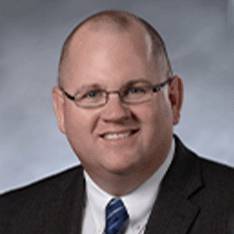
What is your educational background?
BS in occupational safety and health, MS in management, certified safety, and HR professional
Did you know you wanted to go into the risk profession? If not, what was your journey to get here?
Not initially. I changed my major in college once I learned more about it. I appreciate the diversity it brings related to people, business functions, and overall career possibilities.
How long have you been working in the risk profession?
Dealing with both employee and public risk for over 26 years.
What do you love most about what you do?
Integrating with operations to solve problems and bring sustainable structure and improvement. It allows you to continue learning, to drive continuous improvement, and grow both on the technical and soft skill side of the business, including leadership.
Has managing risk changed over the course of your career? If so, how?
Expectations for risk management has increased across all functions of the business, including clear processes, data quality and metrics. Leadership also is giving more opportunities to engage employees in problem solving. Culture can really eat programs for breakfast, so the opportunity for employee engagement, awareness and precise education/learning programs have improved, resulting in improved risk management.
What advice would you give to someone who is about to start their career in the risk profession?
Listen, ask questions, engage others, and don’t let your ego get in the way. Bring a holistic approach to risk considerations and think about the connectedness of the safety management systems and the balancing of resources to work on the right things.
Do you have a personal motto? If so, what is it?
I have several, but my main motto would be: “Assume you have all of the authority in the world until someone tells you that you don’t.” People need to take action, communicate, and fix problems where they are — so don’t use the excuse of being a victim. Add up little wins to get success. Make progress!
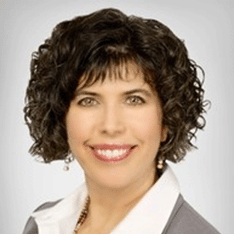
What is your educational background?
Undergraduate degree in risk management & insurance from the University of Georgia; MBA in finance & strategy from Southern Methodist University; I also hold multiple professional designations: CPCU, ARM-E, MLIS, CRIS, ERIS
Did you know you wanted to go into the risk profession? If not, what was your journey to get here?
I changed my undergraduate major from international business to RMI after taking an introduction to risk management class at UGA. My first job out of college was doing risk management information systems at an insurance brokerage. I switched to the risk management side a couple years later and have spent the majority of my career as a risk manager, working in various industries, including hospitality, real estate, financial services, manufacturing, and distribution.
How long have you been working in the risk profession?
Over 25 years
What do you love most about what you do?
I enjoy being a resource and a problem solver for my coworkers. Risk management can often be seen as the bad news department or the department that always says no. Instead of always seeking risk avoidance, I prefer to come up with alternative solutions to challenges faced by the company and to provide guidance to help people make business decisions.
Has managing risk changed over the course of your career? If so, how?
It has changed from tactical to strategic. Risk management is no longer seen as just the transactional purchasing of insurance. Risk managers have a voice in financial and operational decisions, such as developing a captive or other alternative risk solutions and providing guidance on why an acquisition is a good or bad decision for the company. The shift of risk management to a more financial focus is what led me to get my MBA. The move to a more holistic view of risk management throughout organizations is why I added the ERM designation to my ARM. When you see the industry shifting, it’s good to add new tools to your toolbox.
What advice would you give to someone who is about to start their career in the risk profession?
Risk management is one of the few departments in organizations that touches all the other departments. When you work in risk management, it really helps to get out and speak with your coworkers – not just by email, but in person and virtually, too. You have to know what’s going on in the company so you can be proactive in managing risks. The best way to do that is to stay connected with folks in all areas of the organization. Let them know you’re a resource for them so they’ll reach out to you when something comes up. Be curious and be helpful!
Do you have a personal motto? If so, what is it?
“I’m not going to tell you no. I’m going to give you the tools to help you make your own decision.” And “I’m sure there’s a way we can get this done.”
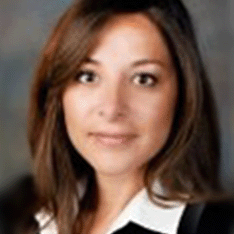
What is your educational background?
Bachelor of Science in legal studies, Bellevue University, summa cum laude Master of Jurisprudence, Texas A&M – School of Law, licensed P&C adjuster, licensed agent CLCS designation
Did you know you wanted to go into the risk profession? If not, what was your journey to get here?
I think a small percentage of people, especially when I started working, fell into this field by accident (no pun intended). I am no exception. I worked in commercial real estate and then in a buying office for a large retailer. The CFO of the retailer requested that I work in the claims department to help automate and organize the department. From there it is history. I built my career through on-the-job learning, lots of hard work, and dedication to furthering my education.
How long have you been working in the risk profession?
20+ years
What do you love most about what you do?
Working with people… my team, the producers, the clients, etc. I love that there is something new to learn, each and every day. No matter how long you have been in the business, there is always something new to learn.
Has managing risk changed over the course of your career? If so, how?
Absolutely! I think that initially we looked at risk in a reactive way versus proactive. I also feel that corporations did not invest as heavily (if at all in some cases) in Risk Management or safety the way they do today. Implementation of ERM programs, ability to dedicate our education to the risk discipline, etc., has incredibly expanded over the years. So many talented and immensely intelligent professionals exist in our field.
What advice would you give to someone who is about to start their career in the risk profession?
I would tell them that they are picking a fantastic field that they will learn from each and every day. I would advise them to major in a risk program at a well-known university and obtain their degree in insurance and risk management. I would further recommend that they attend RIMS meetings, get involved in the industry organizations, collaborate, network, obtain designations, and focus on an area of the profession that excites them and they find interesting. Most important – find a supportive mentor.
Do you have a personal motto? If so, what is it?
“The way to get started is to quit talking and begin doing.” – Walt Disney
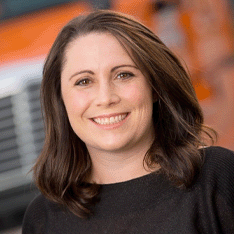
What is your educational background?
Bachelor of Science in biomedical science, minor in chemistry, Master of Business Administration, emphasis in health care administration.
Did you know you wanted to go into the risk profession? If not, what was your journey to get here?
I would say that risk found me. My intention throughout college was to go to medical school after graduation. After shadowing local doctors, I decided that was not the path for me. So, I switched gears and went to law school with the intention of focusing on intellectual property law and patenting biotechnologies. After a brief stint in law school, I decided that was not the best fit for me either. I took a little time to reassess my options and took a job working as an enrollment counselor for a university. What was meant to be just a job turned into a career for me for nine years, where I finished my tenure as the learning center director. During my time at the university I earned my MBA. I came to Schneider by way of a layoff and started as a payroll systems manager. My unique skills and experience were noticed, and I was asked to take a roll in risk management. Although I never considered risk management as a career (it is not typically something every little girl dreams of going into), it is a perfect fit for me. I’m passionate about making a difference in this industry.
How long have you been working in the risk profession?
Four years.
What do you love most about what you do?
Strategy. I am a naturally analytical person, and I enjoy investigating each situation and developing end-to-end strategies that enable efficiency, productivity, cost savings, and optimal customer experiences. Learning: No two cases are the same. I get the opportunity to learn something new each and every day. This role sates my intellectual curiosity. Plus, I finally get to apply knowledge from my undergrad degree! Coaching: Maximizing others motivates me intrinsically. I get pure joy from witnessing growth, support, and love in action. I am driven to make a positive difference in the world around me and the risk field offers and abundance of opportunities to practice this.
Has managing risk changed over the course of your career? If so, how?
Not fundamentally, since I’ve only been in the field for 4 years. However, I came into risk at a time where nuclear verdicts became a reality that we all have to deal with. This causes everyone to perceive risk differently and assign greater attention to risks. I am excited about the advancement of technology within risk. As a systems person, topics like automation through AI and advanced analytics get me jazzed up for the future of risk management.
What advice would you give to someone who is about to start their career in the risk profession?
The world is your oyster. Risk gives back to the people who put the most into it. Dig in, ask questions, bring creative solutions to the table, and never be afraid to push boundaries. Know that the risk field requires a lot of ambiguous decision-making and confidence in your capabilities is key. Lastly, build an extensive toolbox by establishing a trusted network of experts. You will never have all of the answers, and it is critical that you are leveraging the strengths of others.
Do you have a personal motto? If so, what is it?
“Believe in yourself. You gain strength, courage, and confidence by every experience in which you really stop to look fear in the face. You must do the thing you think you cannot do.” – Eleanor Roosevelt
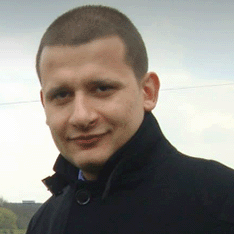
What is your educational background?
I have a bachelor’s degree in accounting from the University of National and World Economy in Sofia, Bulgaria.
Did you know you wanted to go into the risk profession? If not, what was your journey to get here?
My journey was quite long, I started off as a junior accountant in a company called Mapei, then I moved on as a financial analyst in IBM, senior financial controller in Unify, senior continuous improvement specialist in Ingram Micro, and then I started in my current company, TMF as quality enablement analyst, where I expanded my role to quality and business continuity management analyst, and finally decided to take the opportunity to become a risk management officer.
How long have you been working in the risk profession?
A year and a half.
What do you love most about what you do?
Seeing the benefit and the added value that we provide to the business. Risk management is an essential and even critical part of the management in every mature company. It shows weak spots, drives changes, strengthens the company, and enables management to make the right decisions. Seeing how our work and analysis leads to decisions which help us, especially in times of crisis, is the thing that I love most about my job.
Has managing risk changed over the course of your career? If so, how?
I don’t have enough years behind my back in risk management to give a valid comment on this question, but in recent months I have seen examples everywhere of how everybody is starting to look more and more to risk management, realizing how important it is to have a well-managed risk assessment process because companies that do that well are in a way better position compared to the ones who don’t. I think in the coming years, the world of risk management will take on a bigger role in company management.
What advice would you give to someone who is about to start their career in the risk profession?
Risk management along with other company developmental initiatives are considered ad-hoc activities, so expect some push-back from the business in terms of putting in more effort, especially in updating the risk database. My advice is to always explain the benefits and remind them that you are both on the same side, and that you are there to help and support the company’s goals.
Do you have a personal motto? If so, what is it?
I can’t say that I have one, but now that I’m thinking on it, I might say “there is always a way.” Throughout my career I heard a million times “we can’t do it, there’s no way.” Most of the time we tend to want to stick to the old, known, well-tested ways, and we don’t open our eyes and minds to new opportunities and ways to make our job faster, better, smarter. Change is good, and there is always a way.
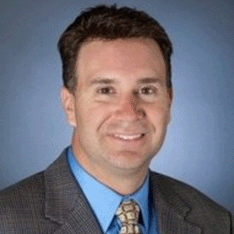
What is your educational background?
I hold a Master of Business Administration with finance and management concentrations from Tulane University’s A.B. Freeman School of Business and a bachelor’s degree in finance from The University of New Orleans with an insurance concentration. I was also a recipient of the university’s Student Leadership Recognition Award.
Did you know you wanted to go into the risk profession? If not, what was your journey to get here?
No, not initially, but I had an encouraging “push” from a mentor. While going to college for my undergraduate degree, I worked in the banking industry. A college professor mentor with whom I had taken an insurance course encouraged me to consider a career in the Insurance industry because of my interest in financial analysis. He told me about what insurance underwriters did, and I took an interest in the industry. I was fortunate to join a well-respected insurance company (Hanover Insurance) as my first job out of college, where I was mentored by three industry-veteran underwriters. It was on-the-job training, and I was given my own territory in Louisiana to underwrite homeowners and automobile coverages. I was accountable for my own P&L, and it was in this job that I found myself enjoying the insurance industry. Five years later, I had the opportunity to join a well-respected offshore marine transportation company (Tidewater Inc.) in New Orleans, as an insurance manager and serve as part of its risk management team. Again, I was fortunate to be mentored by a 27-year maritime attorney, and it was here that I was able to learn about risk management in a marine environment. After four years and with me recently having completed a professional MBA, I was actively looking to move from New Orleans, when an opportunity became available to join Marriott’s risk management team as an international insurance manager. My Tidewater experience helped give me the best skill set to work in an international risk management environment. I’ve been with Marriott almost 20 years, and it’s certainly been the most rewarding career I could have asked for!
How long have you been working in the risk profession?
In total, I’ve worked in the risk profession for almost 27 years.
What do you love most about what you do?
The biggest risk to my organization is brand and reputational risk. When managed well, we can help influence our guest’s perceptions and show that our “Spirit to Serve” culture is truly unique and differentiating to those that stay with us. My team’s goal is to provide the best contractual risk transfer strategies and most cost-effective insurance solutions to help protect Marriott guests and our owners’ hotel assets around the world. This means that we’re challenged to find new insurance solutions in countries like Busan and the Maldives. Every country is unique and so are its risks. Working in so many different countries and cultures helps make my job exciting and very rewarding!
Has managing risk changed over the course of your career? If so, how?
Yes, definitely. In the early years of my career, efficiencies in risk management were defined by systems and financial tools, such as self-insurance through captives, reduction of workers’ compensation costs, understanding and refining loss-cost drivers, and installation of risk management information systems. A company’s risk management strategy was not necessarily aligned to its business strategy or risk appetite. In the 1990s, the concept of managing operational and financial risk management into one holistic approach helped to usher in the concept of Enterprise Risk Management (ERM). Today, successful organizations have risk management fully integrated within and as part of their key business processes. This may include building, refining, and defining a company’s risk management frameworks, risk culture, risk strategy and the board of director level. As a result, there is much more use of actuarial and statistical data to help drive decision making, so that companies can have a better understanding of their entire risk profile. For example, two entirely different risk strategies are needed for cyber and supply chain risk, yet risk managers need to be able to weigh and successfully manage both. These risks, in addition to workforce and regulatory concerns, are what I believe to be the most pressing risks facing our profession today.
What advice would you give to someone who is about to start their career in the risk profession?
First, I would say that the most important quality that a risk manager can possess is the ability to anticipate the problem and not wait for it to occur. Successful risk managers must be willing to take risk. This includes analyzing the issue and giving your opinion when you may not have complete information. Second, executive leadership sees risk management as guardians of the company’s assets and reputation, and they expect the risk manager to understand the company’s risk appetite. Hence, successful risk managers must have good analytical and communication skills and be willing to “manage up.” If the risk manager is not willing to communicate adverse information with leadership, then the risk manager is not serving in the best interest of the organization. Good verbal skills are a must, as often the risk manager is the one employee in the organization that may communicate with the highest level of the C-suite or board one hour, and then go into a meeting with frontline associates the next hour. Last, to be successful in the first two items above, a risk manager needs to completely understand the company’s business operations, as well as the events (internal and external) that could adversely disrupt or impact operational success.
Do you have a personal motto? If so, what is it?
Proverbs 21:21 states, “Whoever pursues righteousness and love finds life, prosperity, and honor.” I’m a firm believer that when we give of ourselves unselfishly, whether through time or resources, God rewards us in ways we can’t imagine. We must be willing to mentor, share with others, and lead all with an unselfish heart.
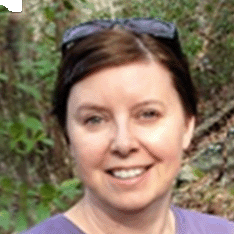
What is your educational background?
Some college for elementary education, mostly on-the-job training in safety, insurance, claims, and software management
Did you know you wanted to go into the risk profession? If not, what was your journey to get here?
I came from a secretarial background and fell into risk management that way. I had been in various jobs within the Veterans Administration and applied for a secretarial job in a different local hospital. The position I ended up getting was the secretary for the director of risk management. After 11 years, I was promoted to risk analyst.
How long have you been working in the risk profession?
15 years
What do you love most about what you do?
I love how every day is different in the requests and challenges that arise.
Has managing risk changed over the course of your career? If so, how?
The types and number of incidents and claims I’ve seen over the years have changed. Risk management software has definitely evolved since I started 15 years ago!
What advice would you give to someone who is about to start their career in the risk profession?
Go for it! It can be a bumpy ride at times, but it’s fun and challenging.
Do you have a personal motto? If so, what is it?
“I can do things you cannot, you can do things I cannot; together, we can do great things.” Mother Theresa
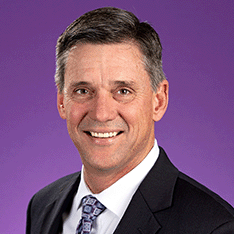
What is your educational background?
I earned a BS in business administration at the University of Arkansas, an MBA at Syracuse University, and an MS in national resource strategy from the Industrial College of the Armed Forces (National Defense University). I am also a graduate of the US Army Command and General Staff College and attained the ARM-E risk management professional designation.
Did you know you wanted to go into the risk profession? If not, what was your journey to get here?
I served 25 years in the United States Army as a finance corps officer and resource manager. In 2009, I transitioned into the career field of enterprise risk management in higher education. It was an interesting career path and professional journey. I found the processes for military decision-making, composite risk management/safety protocols, and operational hazard identification processes very valuable as a foundation for transitioning into the risk management profession.
How long have you been working in the risk profession?
Military leadership involves risk management constantly, so arguably since 1984. I’ve been a risk manager in two different higher education institutions since 2009 (East Carolina University and currently, the University of Wyoming), so a total of 36 years.
What do you love most about what you do?
I love interaction with all levels of our institution and connecting people with effective tools and a framework for identifying and assessing risks, understanding their nature, and effectively treating them.
Has managing risk changed over the course of your career? If so, how?
The basics haven’t changed, but I think there is more of a consideration of the non-conventional risk areas (strategic, reputation/image, speculative, etc.), discussions about opportunities, as well as just risks, and a better appreciation for building corporate risk intelligence to provide assurance and enable better decision-making about resource allocation. Risk management isn’t just about insurance and claims anymore.
What advice would you give to someone who is about to start their career in the risk profession?
Work hard on contextualizing risk and putting individual exposures and possible negative outcomes in relevant perspective to the broader risk profile of the individual, department, or enterprise. Too many leaders – and even some risk managers – tend to look at risks in isolation rather than thinking about their interrelationships and the second- and third-order effects of treatment plans for individual risk issues.
Do you have a personal motto? If so, what is it?
Perhaps not a motto, but I’ve always liked the quote from Edward Everett Hale: “I am only one; but still I am one. I cannot do everything; but still I can do something; and because I cannot do everything, I will not refuse to do the something that I can do.”
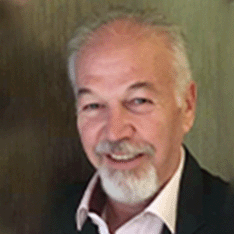
What is your educational background?
Matriculated at school and tertiary studies as fire risk engineer
Did you know you wanted to go into the risk profession? If not, what was your journey to get here?
Partially yes – I started my working career as part of the fire inspectorate and then as a fire consultant for a global insurance broker and progressed further through the risk management and risk financing and insurance ranks with various positions and companies carrying out work across South Africa, UK, and Southeast Asia.
How long have you been working in the risk profession?
43 years
What do you love most about what you do?
Ever-growing knowledge, relationships, and finding solutions.
Has managing risk changed over the course of your career? If so, how?
Massively – partially due to the specific technical risk areas and functions I have journeyed through and partly due to the ever-evolving nature of risk management knowledge, understanding and technology, and of course the nature of risk and future risk, which continues to challenge forward-thinking risk managers.
What advice would you give to someone who is about to start their career in the risk profession?
Be thirsty for knowledge, establish relationships with like-minded people, and continue to reinvent yourself. Never become tired in doing so, and be open to all ideas and change.
Do you have a personal motto? If so, what is it?
Family motto is “Never unprepared but also believe in holding onto all that is good.”
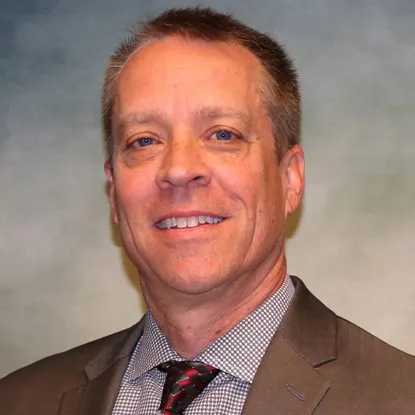
What is your educational background?
BS Aeronautical Engineering Technology JD
Did you know you wanted to go into the risk profession? If not, what was your journey to get here?
No. I’m still on my journey. Career litigation attorney that migrated to Risk Management as part of a transition from private practice to in house counsel.
How long have you been working in the risk profession?
If you count my previous legal career experience, over 30 years.
What do you love most about what you do?
Inconsistency of daily demands and involvement in a wide array of issues at any given time.
Has managing risk changed over the course of your career? If so, how?
Of course. The internet was invented, traditional risk management has evolved and data is sexy. . .
What advice would you give to someone who is about to start their career in the risk profession?
Find as many mentors as you can and collaborate. Be a sponge and always be a good listener. Offer counsel and advice. Don’t tell, instead recommend. But be firm in your purpose and remember that you are not being employed to be passive. Proactive is key!
Do you have a personal motto? If so, what is it?
Family first. Work hard so you can play hard.
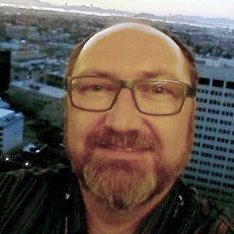
What is your educational background?
BA in Psychology with a minor in integrative health. Obtained insurance agent/broker license in the early 1990s. Studied computer science and became a certified network engineer. Professional education has never stopped and includes database management, data governance, Agile methodology, ARM, Workers’ Compensation Claims Management, business process management, Finance and Treasury management and operations, etc.
Did you know you wanted to go into the risk profession? If not, what was your journey to get here?
I wanted to go into mental health. While in school, I worked in insurance legal transcription. After graduation, I was making more money than any mental health starting position, so I stuck with the risk profession and obtained my agent broker license. Getting bored with office work, I started studying computers and worked in insurance broker system support. I transitioned to work as a Healthcare network engineer and loved building and maintaining data centers. After the downturn of the dot.com bubble of the early 2000s, I found myself using a combination of Healthcare, technology, and risk management for Kaiser Permanente for since 2005.
How long have you been working in the risk profession?
More than 20 years in the risk profession. Five years or so as an agent/broker CSA, and then I moved into Healthcare Network Engineering for a decade. I came back to risk management with a hybrid focus on technology and risk for the last 15 years.
What do you love most about what you do?
I love getting people excited about new ideas to improve business process and even more so when it has positive impact on both the cost of risk and improving the lives employees and customers.
Has managing risk changed over the course of your career? If so, how?
Risk management has matured in organizations to include enterprise risk management and has greater line of sight to the C-suite. The need for data, and quality data has increased to support business decisions as well as risk transfer finance methodologies. Data acquisition has moved from emails and spreadsheets to data feeds from data warehouses. Division and department silos have shifted to a more collaborative model. The interconnections of end-to-end business process impacting frequency, severity, and loss prevention are now woven into the company culture.
What advice would you give to someone who is about to start their career in the risk profession?
Funding risk management programs is a cost without a great deal of hard ROI. Most benefits are loss prevention or protecting the balance sheet. It is key to learn how to communicate the value of risk management to leadership. Risk management also depends on solid data from a variety of sources and portfolios in an organization. Establishing shared taxonomy and terminology early on will avoid confusion and open doors to the quality data sources necessary for modern risk management.
Do you have a personal motto? If so, what is it?
Planning without action is a daydream. Action without planning is a nightmare. **source unknown
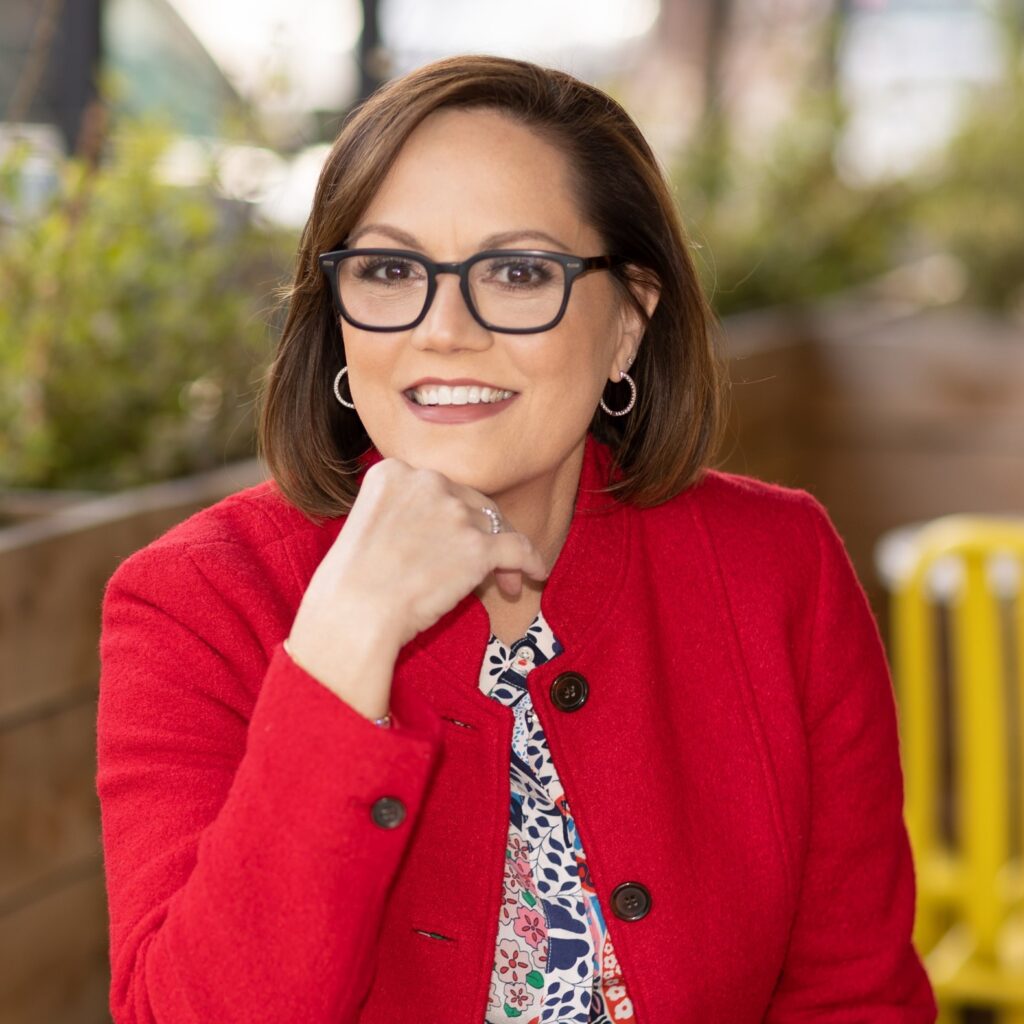
What is your educational background?
Rollins College (undergraduate degree in organizational communication), Crummer Graduate School of Business – MBA
Did you know you wanted to go into the risk profession? If not, what was your journey to get here?
I did not plan to go into the risk profession. My journey started in 1989 when I was working at a jewelry store, and a co-worker shared that there were opportunities at a third-party administration company. (I didn’t even know what TPAs or workers’ compensation were at the time.) I accepted a job as a claims assistant and obtained my workers’ compensation adjusters license within a couple of months.
One of the adjusters I supported went out on maternity leave, and I was promoted to adjuster – with zero experience. This was before voicemail and email, and I am still feeling very sorry for the claimants I was responsible for back then! I believe I had a caseload pushing 200. After about a year, I figured out what I was doing and really liked handling claims. I left that TPA for another one, and eventually went to Walt Disney World in 1996. After 24 years with Disney, I held several interesting roles that expanded my depth and breadth of experiences. I left Disney in April 2020 as VP risk management. I joined Walmart at that time in my current role, VP risk management operations & casualty claims.
I have had the good fortune of being able to raise my hand for new challenges and projects throughout my career, charting my own path at times with jobs I designed, and working for leaders who saw more in me than I was able to see in myself. I sometimes joke that I had the good fortune to work for people who retire, but the reality is that opportunity needs to meet readiness – and I was ready when the opportunities came to me. I’ve had a great career so far and feel like I am just getting started.
How long have you been working in the risk profession?
In total, from that first job in 1989 until today — 32 years.
What do you love most about what you do?
I love the variety of work. It’s never the same from day to day, and I am never bored, which fits my personality perfectly. I can work on things that require singular focus, quiet, and individual attention; and I can collaborate across teams and businesses to make an impact. This occupation is one that has so many different paths – finance, data analysis, legal, medical, advocacy — the list goes on. There aren’t very many jobs that allow you to work from both sides of your brain and have so much variety.
Has managing risk changed over the course of your career? If so, how?
Just consider all of the major world events – natural and manmade – that have occurred for the last 32 years, and risk management has been central to each event. The markets are moved by the environment in which they operate, and the operations must respond to the markets. I believe that occupational and personal safety are viewed very differently than they were 30 years ago. There’s more ownership and responsibility, and I believe we are much safer and smarter. Technology has been central to so many changes and improvements. We work smarter and faster than ever and have probably only scratched the surface of what’s truly possible. It’s an exciting time to be part of this profession.
What advice would you give to someone who is about to start their career in the risk profession?
Be patient and take any opportunity to learn. When I think back, I know that I never would have believed anyone who told me when I was 19 that I would one day lead the risk department for the world’s largest retailer and Fortune 1 company. I never intentionally charted this path, but by being open to different experiences and challenges and learning from those experiences, I found myself ready and willing.
Do you have a personal motto? If so, what is it?
I’m not sure it’s a motto so much as a quote that I have in my office: “Success is not final, failure is not fatal: It is the courage to continue that counts.” Winston Churchill. I want to be successful, but I also will own my failures along the way. They are scars of experience and the path to success.
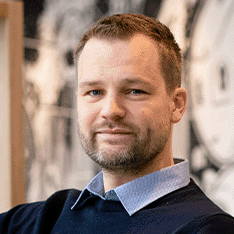
What is your educational background?
Law
Did you know you wanted to go into the risk profession? If not, what was your journey to get here?
No, I didn’t. During law study I specialized in liability and corporate law. During an internship at a small company (broker of insurance and mortgage portfolios (of brokers)), I was made aware of an opportunity to work for a holding company (financial institution) to implement new financial supervisory legislation. That’s where I was introduced to compliance and customer and integrity risks. That grew into consultancy jobs widening my skills and knowledge including risk management. Now I’m responsible for a team that also has a focus on enterprise risk management.
How long have you been working in the risk profession?
In a way risk management has been a part of all roles I have had. From customer due diligence (risks associated to customers) to enterprise risk management. In my consultancy days, I supported risk assessments and provided advice on different compliance and risk aspects. In my time at Vodafone UK, I obtained more skills and responsibilities in corporate risk management. Since early 2017 I’ve been responsible for ERM.
What do you love most about what you do?
Not one day is the same, and no risk is the same (they are similar but never the same).
Has managing risk changed over the course of your career? If so, how?
As with many skill developments you start at the bottom by getting acquainted with the topic, becoming operationally active in the field, and then moving onto more strategic thinking and leadership. I am now in a role leading a team with different backgrounds, responsibilities, and skill sets. I need to ensure they use the same risk methodology in everything they do to maximize the benefits risk management has to offer.
What advice would you give to someone who is about to start their career in the risk profession?
It is not only what you can do for risk management but also what risk management can do for you. If you like to continuously swap between topics and depth (operational vs strategic), be part of all internal and external developments, and be able to analyze and have and opinion about it, then this is the job for you. If not, you need to be open minded and willing to learn, otherwise it will become a struggle.
Do you have a personal motto? If so, what is it?
The words “risk management” do not cover the meaning of the job anymore. I’m a strong believer of opportunity management.
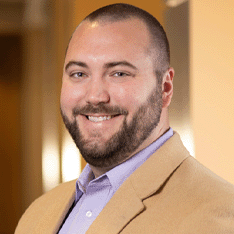
What is your educational background?
Bachelor’s in Mathematics, CRM
Did you know you wanted to go into the risk profession? If not, what was your journey to get here?
No.
How long have you been working in the risk profession?
10 years.
Has managing risk changed over the course of your career? If so, how?
Yes. Implications of mismanaging risk have grown over the years as a result of nuclear-claim verdicts, social media, and many more.
What advice would you give to someone who is about to start their career in the risk profession?
Always challenge your understanding of how things work because stagnant risk management can lead to disastrous outcomes.
Do you have a personal motto? If so, what is it?
Smarter, faster, better.
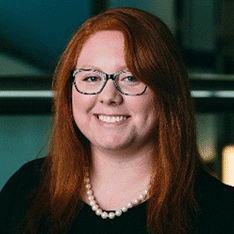
What is your educational background?
BA in biology with a minor in chemistry and Spanish, Master of Health Administration
Did you know you wanted to go into the risk profession? If not, what was your journey to get here?
No. My MHA internship was with my current company, analyzing provider compensation. Through that experience, my boss saw my decision-making skills and inherent calm in chaos. They desperately needed someone to head up risk management, and they offered me the job. I didn’t know what I was truly getting into, but I’m so grateful they brought me to it.
How long have you been working in the risk profession?
2.5 years
Has managing risk changed over the course of your career? If so, how?
Yes. COVID. It changed so much for healthcare.
What advice would you give to someone who is about to start their career in the risk profession?
Learn how to ground yourself in the chaos that might come your way. Also create habits early on that allow you time for the slow but important needs that seem to be in the background. Don’t let the tiny, in-your-face emergencies suck your time.
Do you have a personal motto? If so, what is it?
Did anyone die today? No. Then we are going to be okay.
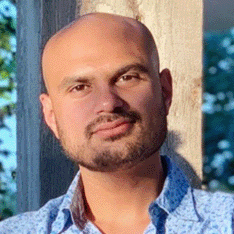
What is your educational background?
Business Administration, Computer Engineering
Did you know you wanted to go into the risk profession? If not, what was your journey to get here?
No. I got exposure working in management consulting and started working with financial risk management. I then got a chance to continue working with healthcare risk management, first as an auditor then project manager and now implementing ERM.
How long have you been working in the risk profession?
8 years.
Has managing risk changed over the course of your career? If so, how?
Yes. It has evolved from a financial focus to a clinical-centered approach. Now it is enterprise-wide, trying to break down silos across operations and delivery of care.
What advice would you give to someone who is about to start their career in the risk profession?
Do not go alone. Take leadership with you. Take the challenge of conquering one risk at a time, do not shy from breaking it into small multiples, and listen to all the stories your technology/data is telling. More time listening, even greater time planning and strategizing because executing a will be a breeze if you are aligned from top to front line.
Do you have a personal motto? If so, what is it?
Change is Good! Try to lead it when you can. Those discoveries will be the story of life.
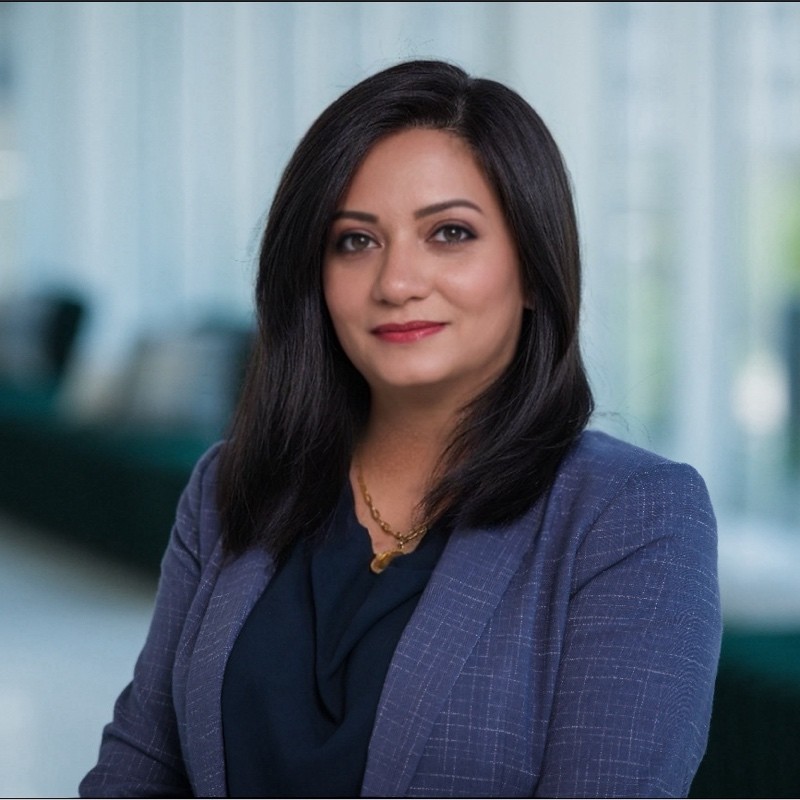
How were you first interested in the risk profession?
Being in the project controls profession introduced me to the world of risk management. Initially, my focus was on scheduling, cost tracking, and performance metrics, but as I became more involved in project planning and execution, I realized how integral risk identification and mitigation are to successful outcomes. This exposure sparked a genuine interest in risk management, leading me to explore its methodologies and tools more deeply. It’s now a growing area of passion and professional development for me.
What’s the biggest change in managing risk you’ve seen over the course of your career?
The biggest shift I’ve seen in managing risk is the move from reactive tracking to proactive, enterprise-level strategy. Risk is no longer just a project-level concern. It’s now integrated across departments, supported by AI-driven forecasting, and continuously monitored throughout the project lifecycle. This evolution has made risk management more collaborative, transparent, and impactful.
How do you stay up to date with industry trends and developments?
I stay up to date by actively participating in peer team meetings, leading internal learning sessions, and following industry trends through professional networks and conferences. Collaborating across departments and engaging with evolving tools and methodologies keeps my knowledge fresh and relevant.
What advice would you give to someone who is about to start their career in the risk profession?
Start by building a strong foundation in project controls to understand scheduling, cost, and performance metrics. Then, focus on learning how risks impact project outcomes. Stay curious, ask questions, and engage with experienced professionals. Most importantly, embrace collaboration and transparency. Risk management is a team effort.
What’s your favorite thing to do outside of work?
My favorite thing to do outside of work is hiking. It helps me recharge, stay active, and enjoy nature especially when exploring trails like those around Charlotte, NC
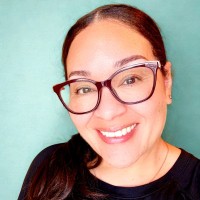
How were you first interested in the risk profession?
Honestly, I didn’t set out to be in the risk profession. It found me. I’ve always had a sharp eye for patterns and an instinct for asking the right questions. Early in my career, I was always the one spotting gaps, connecting dots, and challenging the “we’ve always done it this way” mindset. Eventually, I realized that what I was doing was risk management. Once I leaned into it, I saw how powerful it could be, not just for protecting a business, but for shaping smarter, stronger strategies. Risk management is applicable not only in business but also in your personal life.
What’s the biggest change in managing risk you’ve seen over the course of your career?
The shift from reactive to proactive risk management has been huge. When I started, risk was often treated like a checklist, and it was something you dealt with after the fact. Now, it’s embedded in decision-making, strategy, and culture. We’re not just identifying risks; we’re anticipating them, modeling them, and using data to tell stories that drive action. It’s more dynamic, more collaborative, and way more impactful.
How do you stay up to date with industry trends and developments?
I read, I listen, and I connect. I follow thoughtful leaders, attend webinars, and stay plugged into internal and external networks. But I also believe in learning from the ground up, talking to people who do the work, asking questions, and staying curious. Trends are great, but context is everything. I make sure I understand how changes actually affect the business and the people behind it.
What advice would you give to someone who is about to start their career in the risk profession?
Start with curiosity and stay humble. Risk isn’t just about frameworks and controls. It’s about understanding people, processes, and possibilities. Learn the language of the business, build relationships, and don’t be afraid to speak up because your perspective matters. Also, document everything (I even save my call transcripts)! And don’t be afraid to fail. Failing is how we learn. Give yourself grace. There are people I know who have been in risk management for 20+ years, and they are still learning and growing
What’s your favorite thing to do outside of work?
I’m a wife, mom, a plant mama with over 100 green babies, and a dog mom to a wild little puppy. I love writing poetry and vibing to old-school hip-hop ( used to be a rapper). I’m also big on affirmations and self-love. Whether I’m creating content or just chilling, drinking a cup of coffee/matcha, I’m always finding ways to pour back into myself.
